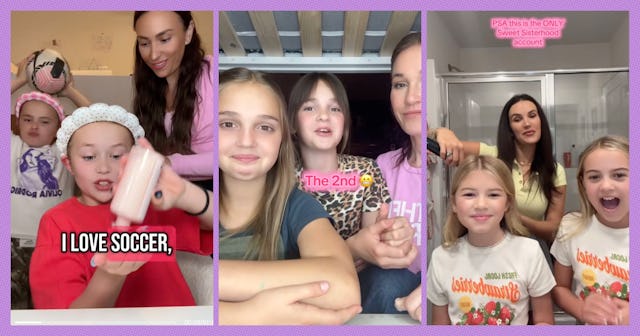A Gen Alpha Kid-Influencer "Content House" Has Gone Viral. Should People Be Concerned?
Is this girl power or child exploitation?

You might have heard of the Hype House and the Byte Squad content houses. Two of several “content houses” where social media influencers and content creators live and collaborate to produce content for platforms like YouTube, TikTok, and Instagram. These extravagant houses often have features like pools, large gardens, and good lighting to facilitate content creation and collaboration.
They often implode, but that’s neither here nor there.
Now, there’s another content house making the rounds — The Sweet Sisterhood.
And while people already have negative opinions on content houses made up of adults, this one is made up of children (and their moms). While the idea is touted as one of sisterhood and girl power, is this actually just child exploitation?
Journalist and writer for outlets like The Cut and Rolling Stone, Fortesa Latifi, wrote a piece for Teen Vogue on the house, interviewing some of the moms and kids. She posted an inside scoop on her TikTok.
“The Sweet Sisterhood is a content house made up of nine mega-popular Gen Alpha girl influencers,” Latifi says.
“They have a combined following of tens of millions of fans and subscribers. There's definitely been some side eyeing at the launching of a content house made up of kid influencers in the wake of scandals with content houses ... but Adria Garza, the mom of the Garza crew, told me that their content will speak for itself once people see how wholesome it is. So, she's not really worried about the backlash.”
“I also talked to Ami McClure, who’s the mom of ... twin kid influencers, Ava and Alexis, who have 4.1 million subscribers on YouTube. She told me that she's seen the documentaries about the dark side of kid influencing, but that she knows who her family is and what they do,” she continued.
“She also said, ‘I think the pressure needs to be on that way. Hopefully, the families that are causing this bad spotlight can be rooted out. It definitely brings some scrutiny your way sometimes that I think is warranted, but if you have nothing to hide, you won't be fearful.’”
According to Latifi, The Sweet Sisterhood crew will meet up several times a year at different locations, and they'll split the profits of the videos five ways. Then, the moms will be in charge of sharing the profits with the kids.
“In the first few days since the launch of The Sweet Sisterhood, they've gained 250,000 subscribers on YouTube, 37,000 followers on Instagram, and 32,000 followers on TikTok,” she concluded.
The Sweet Sisterhood is made up of Haven and Koti Garza, known as the Garza Crew; Ava and Alexis McClure known as the Mighty McClures; Scarlett from Scarlett and Tiania; Mila and Emma Stauffer; and Britain and Baylaa.
“All of our kids are in a very unique position that maybe a lot of other kids their age can’t relate to,” Garza said in the article for Teen Vogue. She hopes that The Sweet Sisterhood will help her daughters adjust to fame by spending time with other girls their age who can understand what life as a famous kid influencer, noting that their content will be “inspirational.”
“It’s really just about empowering girls and uplifting them,” Garza says. “We can help these young girls find a place to go where they’re actually going to get good advice, wholesome role models they can look up to. Stuff like that.”
Okay, regardless of how “wholesome” the content created in The Sweet Sisterhood is, how is this not under the umbrella of child exploitation?
“The content can be as wholesome as ever. Yet it’s still child exploitation to profit off of your child,” one user wrote on Latifi’s TikTok.
“the timing of this launch with the Netflix doc 🥴,” another said, referring to the recent Netflix docuseries, Devil in the Family, which exposed the dark side of family influencer Ruby Franke.
Another said, “Someone show us the follower analytics…” And we all know what that is referring to...
One user asked, “how’s this legal 💀”
“The law hasn’t caught up with the social media age unfortunately. Child actors on official shows have some protections (not perfect but at least some guardrails) kids who are exploited for socials have zero protection. There aren’t any rules about how often these kids can film content or if their parents actually have to share profits with their kids,” another TikToker responded.
The needle has been moved somewhat when it comes to child protection laws and social media exposure. In March 2025, Utah became the fourth state to protect child performers with the passage of H.B. 322.
The bill, sponsored by Democratic State Representative Doug Owens, establishes more robust protections for child actors and influencers. It was championed by Shari Franke, one of the six child stars featured on the 8 Passengers YouTube channel run by her mother, convicted abuser Ruby Franke. In speaking to Utah legislators last October, Franke was unequivocal in her condemnation of family vlogging, which she categorized as “24/7 labor.”
The law does not ban family blogging or prevent children from achieving influencer status, but it does establish a formula to calculate a child’s entitlement to earnings made from their content. Moreover, it requires families making more than $150,000 a year who use children in monetized or sponsored videos to establish a trust fund for those children.
Hopefully, eventually, this will be a nationwide norm.